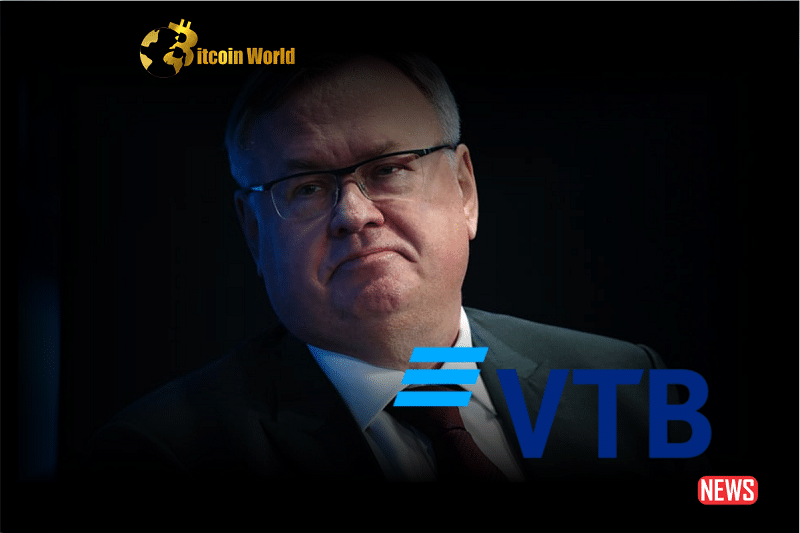Is the reign of the US dollar as the undisputed king of global currencies nearing its end? According to Andrey Kostin, the CEO of Russia’s VTB Bank, the winds of change are blowing, and the Chinese Yuan is emerging as a formidable contender. Let’s dive into why this seasoned financial leader believes a significant power shift is on the horizon.
Why the Dollar’s Dominance is Being Questioned
Kostin’s perspective isn’t just speculation; it’s rooted in recent geopolitical events. He points directly to the actions taken by the United States and its allies in restricting Russia’s access to its gold and foreign exchange reserves. Think of it like this: when a major player’s assets are frozen, other nations start looking for safer harbors. This has triggered a search for alternatives to the dollar for international trade settlements.
The Chinese Yuan Stepping into the Spotlight
In a recent interview that’s got the financial world buzzing, Kostin boldly stated his belief that the Chinese Yuan has the potential to not just challenge, but potentially surpass the US dollar as the world’s leading currency. This isn’t just about one person’s opinion; it reflects a growing sentiment among some global players.
What’s Driving the Yuan’s Rise?
- Necessity is the Mother of Invention: The restrictions imposed on Russia have undoubtedly pushed them and other nations to actively seek alternatives to the dollar.
- China’s Economic Muscle: Let’s face it, China’s economic growth is undeniable. As their economic influence expands, so does the appeal of their currency.
- Loosening the Reins: Kostin highlights a crucial point – China’s potential to ease its currency controls. Currently, China has strict foreign exchange rules. Removing these restrictions would be a game-changer, making the Yuan more accessible and attractive for international transactions.
“The Era of the American Dollar’s Dominance is Coming to an End”
These are strong words from Kostin, emphasizing the perceived shift in the global financial landscape. He directly calls for China to “gradually remove currency restrictions” to fully realize the Yuan’s potential on the world stage.
Why Loosening Currency Controls Matters
Imagine a world where the Chinese Yuan is as easily convertible as the US dollar. This would significantly boost its appeal for international trade and investment. China understands this. They recognize that relaxing these controls is a vital step towards achieving their ambition of becoming the world’s leading economic power.
Concerns About US Debt: A Looming Shadow?
Kostin isn’t alone in voicing concerns about the US financial situation. He specifically cautioned against China’s continued accumulation of US debt, labeling it as “dangerous.” This sentiment is echoed by prominent figures like billionaire investor Ray Dalio.
Dalio’s Warning: Weaponization of the Dollar and Debt Concerns
Dalio points to the “weaponization of the dollar” during the Ukrainian conflict as a reason why countries are becoming wary of investing in US debt. Think about it – if your assets can be frozen or used as leverage, you might think twice about where you park your money. Dalio even goes as far as to warn of a potential US debt crisis, suggesting the government might struggle to find buyers for new bonds.
The Evolving Global Currency Landscape: What Does It All Mean?
So, what’s the takeaway from all of this? The global currency landscape is in flux. The long-held dominance of the US dollar is facing a credible challenge, primarily from the Chinese Yuan. Several factors are contributing to this potential shift:
- Geopolitical Tensions: Actions like the sanctions on Russia have accelerated the search for alternative currencies.
- China’s Economic Powerhouse: The sheer size and growth of the Chinese economy provide a strong foundation for its currency.
- Potential Policy Shifts: If China eases its currency controls, it could significantly enhance the Yuan’s global appeal.
- Growing Concerns About US Debt: Wariness about the sustainability of US debt and the potential for the dollar to be used as a political tool are pushing some nations to diversify.
Challenges on the Yuan’s Path to Dominance
While the Yuan’s potential is significant, it’s not without its hurdles. Here are some key challenges:
- Full Convertibility: The biggest hurdle remains the strict currency controls. Moving towards full convertibility is a complex process.
- Trust and Transparency: Building the same level of global trust and transparency as the US dollar requires time and consistent policies.
- Geopolitical Stability: Global political events and China’s own international relations will play a role in the Yuan’s acceptance.
Actionable Insights: What to Watch For
Keeping an eye on these developments is crucial for businesses, investors, and policymakers alike:
- China’s Currency Policy: Any significant moves towards easing currency controls will be a major indicator.
- International Trade Settlements: Track the increasing use of the Yuan in cross-border transactions.
- Central Bank Reserves: Monitor how central banks around the world are diversifying their foreign exchange reserves.
- Geopolitical Events: Pay attention to how global events influence currency preferences.
Conclusion: A New Era of Global Finance?
The assertion by VTB Bank CEO Andrey Kostin about the potential rise of the Chinese Yuan is more than just a prediction; it’s a reflection of the shifting dynamics in the global financial order. While the US dollar’s dominance has been a defining feature of the modern economic landscape, the confluence of geopolitical events, China’s economic ascendancy, and growing concerns about US debt are creating an environment ripe for change. Whether the Yuan will fully eclipse the dollar remains to be seen, but the conversation has undoubtedly begun, signaling a potentially transformative era in global finance. The journey of global currencies is a marathon, not a sprint, but the direction of travel is becoming increasingly clear.
Disclaimer: The information provided is not trading advice, Bitcoinworld.co.in holds no liability for any investments made based on the information provided on this page. We strongly recommend independent research and/or consultation with a qualified professional before making any investment decisions.




